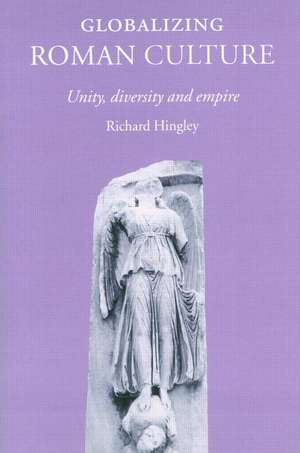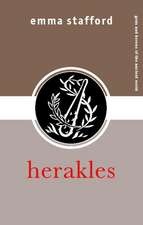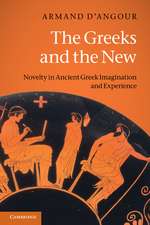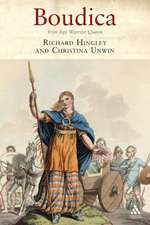Globalizing Roman Culture: Unity, Diversity and Empire
Autor Richard Hingleyen Limba Engleză Paperback – 14 mar 2005
Romanization has been represented as a simple progression from barbarism to civilization. Roman forms in architecture, coinage, language and literature came to dominate the world from Britain to Syria. Hingley argues for a more complex and nuanced view in which Roman models provided the means for provincial elites to articulate their own concerns. Inhabitants of the Roman provinces were able to develop identities they never knew they had until Rome gave them the language to express them.
Hingley draws together the threads of diverse and separate study, in one sophisticated theoretical framework that spans the whole Roman Empire. Students of Rome and those with an interest in classical cultural studies will find this an invaluable mine of information.
| Toate formatele și edițiile | Preț | Express |
|---|---|---|
| Paperback (1) | 367.90 lei 6-8 săpt. | |
| Taylor & Francis – 14 mar 2005 | 367.90 lei 6-8 săpt. | |
| Hardback (1) | 1001.07 lei 6-8 săpt. | |
| Taylor & Francis – 7 feb 2005 | 1001.07 lei 6-8 săpt. |
Preț: 367.90 lei
Nou
Puncte Express: 552
Preț estimativ în valută:
70.41€ • 76.45$ • 59.14£
70.41€ • 76.45$ • 59.14£
Carte tipărită la comandă
Livrare economică 23 aprilie-07 mai
Preluare comenzi: 021 569.72.76
Specificații
ISBN-13: 9780415351768
ISBN-10: 0415351766
Pagini: 222
Ilustrații: 10
Dimensiuni: 156 x 234 x 14 mm
Greutate: 0.41 kg
Ediția:1
Editura: Taylor & Francis
Colecția Routledge
Locul publicării:Oxford, United Kingdom
ISBN-10: 0415351766
Pagini: 222
Ilustrații: 10
Dimensiuni: 156 x 234 x 14 mm
Greutate: 0.41 kg
Ediția:1
Editura: Taylor & Francis
Colecția Routledge
Locul publicării:Oxford, United Kingdom
Public țintă
Postgraduate and UndergraduateNotă biografică
Specialist in Roman studies, with a particular focus upon Roman imperialism and the context of Roman research. Lecturer in Roman archaeology at the University of Durham. Author of Roman Officers and English Gentleman (Routledge 2000) and Images of Rome (Journal of Roman Archaeology, 2001).
Recenzii
'A valuable addition to the scholarly literature.' - BMCR
'The explicit recognition of the complex relationship between past and present is one of the book's many strengths... a sophisticated and nuanced picture of 'Roman' identities... this book will do much to set the tone for a new generation of studies of the Roman World.' - Britannia
'The explicit recognition of the complex relationship between past and present is one of the book's many strengths... a sophisticated and nuanced picture of 'Roman' identities... this book will do much to set the tone for a new generation of studies of the Roman World.' - Britannia
Cuprins
Globalization and Roman Culture: unity, diversity and empire. 1. The past in the present The changing past. The power of the past. A discourse of Western domination. The potential of archaeological research. Anachronism. 2. Changing concepts of Roman identity and social change Classical inheritances. Civilization. Barbarity. Interpreting Romanization in the context of Western culture. Modernist Romanization. Critical assessment. Native reactions. The ghost of modernism. Reintroducing power relations. Re-constructing Roman Culture in a global context. 3. Roman imperialism and culture Defining Roman elite culture. Culture. Roman culture. Writing about elite culture. Barbarians. The opportunity of conquest. Civilizing missions? Classical education. Elite culture as imperial discourses. 4. The material elements of elite culture Projecting Roman elite identity. Dress and appearance. Creating urban space. Creating domestic space. Standardized developments? 5. Fragmenting identities Spreading Roman culture? Soldiers. 'The empire writes back'. 'Discrepant experiences' in the landscape. Consuming Culture. Pottery and consumption. The limits of connectivity. 6. 'Back to the future'? Empire and Rome. Enabling and imposing.
Descriere
A study of identity and social change in the Roman empire and the relationship of this knowledge to understanding of the contemporary world.














